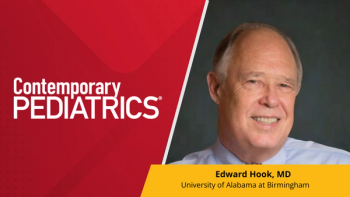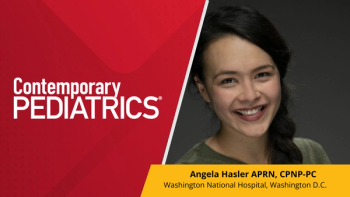
How health care institutions can help fight climate change
Sandra H. Jee, MD, MPH, professor of pediatrics, director, Center for Community Health and Prevention, Finger Lakes Children’s Environmental Health Center, University of Rochester Medical Center, addresses how health care institutions contribute to the climate crisis. In this Contemporary Pediatrics® interview, Jee provides practical examples health care professionals can use in their offices to better help the environment, which can better help patients in the long term.
Transcript (edited for clarity):
Contemporary Pediatrics®:
Hi, and thank you so much for joining us. I'm Joshua Fitch, editor of Contemporary Pediatrics®.
Sandra Jee, MD, MPH
I'm Sandy Jee. I am a professor of pediatrics at the Center for Community Health at the University of Rochester, and also the director of the Finger Lakes Children's Environmental Health Center here.
Contemporary Pediatrics:
Dr. Jee, thank you so much for taking the time to speak with us. Today we're talking about pediatric health related to climate change and how fossil fuel divestment can play a role. Amid your commentary [in the Yale Journal of Biology and Medicine), what did you find when it comes to health care settings, and its respective relation to greenhouse gas emissions or toxic air pollutants?
Jee:
I think it's really important for all of us to understand the role that health care plays in contributing to the climate crisis. Healthcare institutions, such as the hospital that I work for, never turn off its lights, or its machines. The United States healthcare system is responsible for anywhere from 8% to 12% of greenhouse gas emissions, and I was not even aware of that. The United States healthcare system is even more polluting as a country, [and] altogether would be considered one of the most polluting countries in the whole world. It is a problem and I think it's something that most healthcare providers may not be aware of, just unwittingly, how our work is making the climate crisis even more of a problem.
Contemporary Pediatrics:
You mentioned to me the awareness. This is bringing awareness to pediatricians who may not understand how they're even contributing. What are some of the actions that are impacting the pediatric population? How is that population being impacted as a result of these environmental impacts?
Jee:
I think that's a really important question. I think people really care more when it affects them directly. I've been seeing insidiously over the past couple of years, you know, rates of say Lyme disease. I went to school at Yale University in Connecticut. At that time, Lyme disease was like a novel disease in Connecticut. Now it's everywhere and it's encroaching higher and higher and higher, not just in Connecticut, because vector borne diseases, such as Lyme disease, which pediatricians see, which adult medicine people see, are all a direct result of the warming planet that has changed our ecosystem. So it's happening with even heat related illnesses. But then, you know, we kind of forget about and we go back to our regular life. But that's why at a higher level, this fossil fuel divestment is really important, because everybody in just daily work is contributing to increased greenhouse gas emissions, which is warming our planet, which is changing the spread of disease.
Contemporary Pediatrics:
Thank you for that, Dr. Jee. What kind of role can pediatricians or everyday healthcare providers play when it comes to this divestment? Are there obstacles or hesitancies they may encounter while doing so? Practically, how can they contribute in this way?
Jee:
Just having raised an enhanced awareness of everything that's going on, causing the climate crisis, to become a public health emergency is really important. But as a pediatrician, and I'm a general pediatrician, I do regular checkups and see healthy kids, I don't want to alarm my patients and say, 'Hey, your world is being ruined', right? It's not a good message. Really, we can start raising awareness, and I talk about this with my trainees, what are things within your sphere of influence? It's very overwhelming when you think about the climate crisis to feel like, 'oh my gosh, the world is falling apart. What am I going to do? There are wildfires. Okay, I'm just going to do my usual stuff. I can't deal with it.' But instead, if you think about what's within your sphere of influence, you could walk or carpool to work. You could get an electric powered vehicle, you could (and this is very impactful for being a pediatrician) advocate for nutrition by eating less meat. I have recently learned that one of the most impactful things you can do is eat less red meat. There are different types of meat, red meat is the worst. Apparently, lamb is also not very good in different things. So I'm not saying everyone has to be vegetarian, but eating more plant based and locally sourced is not only good for the economy and your local farmers, but it is also good because it decreases methane emission from cows. So it's hard for me to explain this to patients. When I get into talking about nutrition, I don't really get into that with a lot of them. Some of the teens are more interested in that and you can have a conversation. It's not part of your conversation you have with a newborn baby, but I think advocating for breastfeeding is very, very important as a way of really thinking about 'how do you invest in our planet?', In many areas of the world, breastfeeding is actually the safest, best food for infants. Thinking of it in that way, if you're not using formula in plastic bottles that are transported across the world. There was a formula shortage not too long ago, that was a huge problem for pediatricians. If everybody could just invest a little bit more on breastfeeding, that would be one way that you are actually helping the climate crisis. So I think those are ways that I tried to make connections. Eating locally sourced plant based diets is very important as a pediatrician, and then really advocating for those patients who have especially have respiratory problems, to really think about their exposure to poor air quality, both indoors and out. There's new research that's just emerged about the negative impact of indoor gas exposure for children who have asthma and respiratory problems. So I'm learning about this myself now because I'm teaching an advocacy group of students this summer through the New York State Children's Environmental Health Network. We're learning about how do you create more sustainable living and built environments? And so one thing I've learned, which is a little bit disturbing to me, is that I have a gas stove at home; there is new evidence showing that children rates of asthma are greatly increased if they live in homes with gas stoves. How are we that we are less reliant on fossil fuels? It's challenging, you know, but I think thinking about your sphere of influence, what are some small things that you can do for yourself, for your community, that can be impactful.
Contemporary Pediatrics:
From a practice improvement standpoint in an everyday pediatrician’s office or general health care providers office that see children, do you have any suggestions on what can be done, again, from an office standpoint to maybe help with this awareness?
Jee:
I think that's a great question. So I have another paper that's coming out in this journal (YJBM) that's about a sustainability project we did in our office. So we created a green team with me, another doctor, nurse secretary, an interdisciplinary team to think about 'what are ways that we are being wasteful in our office and what can we do?' We realized we did not even have recycling bins. I work for the University of Rochester, we have tons of paper generated in our office, we did not even have recycling bins. So we work with environmental sciences, we now recycle all our paper. One project that we did, and we're happy to share this, is we have very intentionally decreased our paper usage. So we used to print out these color vaccine information sheets. That's required. It's a law to give parents information about the vaccines that kids are getting. But in our office, the parents always left it on the desk. We gave them 20 sheets of paper. A 1-year-old gets 5 or 6 different shots. So then they're getting 12 to 14 pieces of colored paper that is just printed and then thrown into the garbage, not even recycled. So, what we did was we compiled all that into one single black and white sheet that has QR codes. We used to give them that one piece of paper and said, 'you can use your smartphone to scan this and you can get all the pieces of paper that tell you about all the shots that you're getting.' But parents didn't even want that one sheet of paper. So now what we do is we laminated this one black and white sheet of paper. We have it next to all the computer monitors, and we give it to the parents and we circle it with a pen that we can wipe off, and we said 'we're getting you're getting the shots, do you want any information?' And usually they don't, but they could scan it with their phone, and we don't even give them that paper. So, we've estimated that in our office, I think we've saved 80,000 pieces of paper a year. That's just our office, but we do have the largest pediatric practice in Rochester. So if every office looked around and said, 'you know, could we use less paper? Could we, you know, have one day where people carpool to work?' or something like that. Those are ways that within your office space, it's a team building exercise too. I think people in our office really kind of [got] behind it because they felt like, 'OK, we're doing something together, sort of helping the planet.' Those types of things make it a positive work environment.
Newsletter
Access practical, evidence-based guidance to support better care for our youngest patients. Join our email list for the latest clinical updates.








